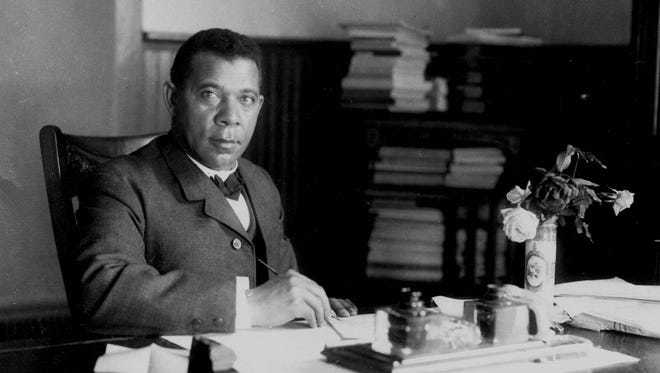- Have any questions?
- (561) 206-2574
- [email protected]
Booker T. Washington: American Educator

Famous Children’s Authors: Roald Dahl
February 3, 2021
Dav Pilkey and “Captain Underpants”
February 23, 2021Booker T. Washington: American Educator

Booker T. Washington: one of the most influential African Americans in United States History. He was known for showing that an oppressed people could advance through his concept of practical education and progressed ideals of cooperation between the races and the advance of African American commerce as a boon to all Americans.
Booker Taliaferro was born in April 1856, the son of an unknown white man and a slave named Jane who was the cook of James Burroughs, a small planter. In 1860, Jane married Washington Ferguson, an enslaved man from a nearby plantation. Booker later took the first name of his stepfather as his last name when he entered school. Booker worked by his stepfather packing salt into barrels.
In 1856, Booker at age 12 found a job as a houseboy for the wealthiest couple in Malden, Virginia. Mrs. Ruffner, his boss and a former teacher was so impressed with Booker, she allowed him to attend school for one hour a day.
At age 16, Booker attended the Hampton Normal and Agricultural Institute, a school for Black people in Hampton, Virginia. The principal, Samuel Chapman Armstrong, a white man, believed that the progress of freedman and their descendants depended on an education of a special sort, which would be practical and utilitarian and would inculcate character and morality. At Hampton, Booker studied academic subjects and agriculture and loved public speaking and debate. He was chosen to speak at his commencement in 1875 and graduated with honors.
Thereafter, Booker returned to Malden to teach and was also a student at Wayland Seminary.
In 1879, Booker returned to Hampton to teach Native Americans.
In 1880, a bill was passed by the Alabama State Legislature to establish a school for Blacks in Macon County. Armstrong recommended Booker to act as the principal. The school opened in a shanty in 1881, which Booker expanded from money borrowed from the Hampton Institute’s treasurer. He purchased an abandoned 100-acre plantation on the outskirts of Tuskegee. By 1888, the 540-acre Tuskegee Normal and Industrial Institute had an enrollment of more than 400 students. In Tuskegee’s 25th year, Booker had transformed an idea into a 2,000-acre, eighty-three building campus.
In 1895, Booker gave a highly regarded speech known as the “Atlanta Compromise” where he expressed his firm belief that Black and White Americans should work together to achieve economic prosperity and racial harmony. He urged Southern whites to give Black businessmen a chance to succeed.
Booker showed how an oppressed people could advance. His concept of practical education was a contribution to the general field of education. He wrote 40 books, which were widely read and highly regarded.
Booker died on November 15, 1915 and with 8,000 people at attendance at his funeral, he was buried on campus in a brick tomb, made by students, with a commanding view of the entire campus.
REFERENCES
https://www.tuskegee.edu/discover-tu/tu-presidents/booker-t-washington
https://www.britannica.com/biography/Booker-T-Washington
https://www.thoughtco.com/booker-t-washington-1779859
Harlan, Louis R. Booker T. Washington: The Making of a Black Leader, 1856-1901. Oxford, 1972.
Wells, Jeremy, “Booker T. Washington (1856-1915). Encyclopedia Virginia.

